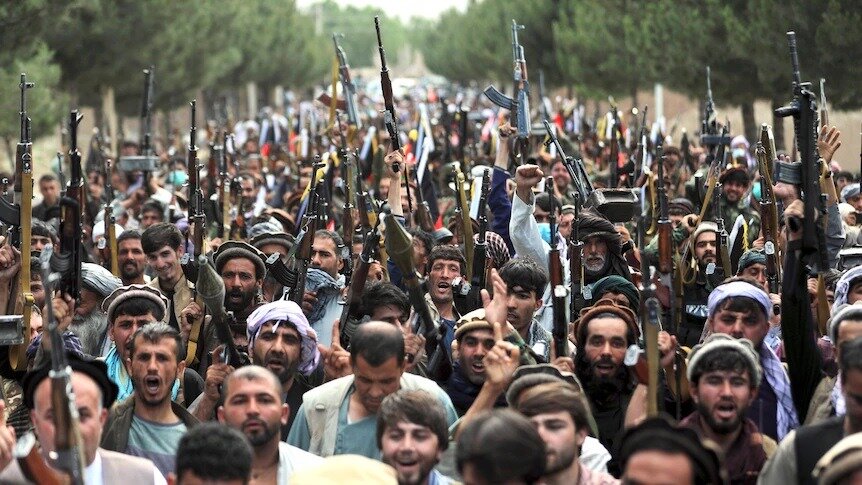A moment for regional cooperation on Afghanistan

TEHRAN – After two decades of war and destruction, the United States announced the end of its military mission in Afghanistan, leaving the country stateless and chaotic. With the U.S. gone, neighbors of Afghanistan find themselves in a situation that could spiral out of control if they sit back.
On Monday midnight, the last U.S. service member boarded a military plane to leave the untidy and messy airport of Kabul, creating a historic moment that could go down in history as the day when the U.S. surrendered to an enemy it failed to defeat for two decades.
When the U.S. attacked Kabul, the Taliban was in power and when it fled Kabul two decades later the Taliban was still in power. So, what the U.S. has achieved during this war other than death and destruction? Nothing. Of course, the U.S. is not going to live with the consequences of its Afghan fiasco. Afghanistan’s immediate neighbors will have to bear the brunt of U.S. adventurism.
In recent weeks, thousands of Afghans fled their country after the Taliban took over Kabul. Many of them tried to enter Iran. Others escaped to Pakistan. In addition to the influx of refugees, Afghanistan’s neighbors face growing dangers of insecurity in a country where the state historically had no deep clout over society.
These fears have also led some Afghans to seek help from neighboring countries. These Afghans believe that neighbors such as Iran and Pakistan are in a position to act in harmony to help Afghans form an inclusive government that would have to tackle challenges and meet the needs of Afghans from all walks of life.
Mohammad Esmail Qassem Yar, a former head of Afghanistan’s Loya Jirga in the period after the Bonn conference, has underlined the need for convergence among Afghanistan’s neighbors. “Certainly, our neighbors, especially Iran and Pakistan, can play an effective role in maintaining peace and stability in Afghanistan through cooperation and convergence. Otherwise, the consequences of Afghanistan's problems on its neighbors are certain,” Qassem Yar told Iran’s Strategic Council on Foreign Relations (SCFR).
He assessed the history of Iran-Pakistan positions in helping to solve Afghanistan's problems and efforts for convergence as constructive and positive, adding that “Fortunately, the Taliban have emphasized so far that they are not the Taliban of yesterday, they are paying attention to the needs of the time, they are thinking about the future, they want the country to develop and the people to enjoy prosperity. Therefore, with such a view, it seems that Afghanistan's neighboring countries will have more opportunities to establish constructive channels of negotiations and continue dialogue.”
The government formation process would serve as a litmus test of whether the Taliban have changed for the better. The formation of an inclusive government will put the group’s claims of change to a real test.
“Certainly, the real manifestation of the change in the Taliban's approach will be the formation of a pluralistic and inclusive government in Afghanistan with the presence of all influential and interested parties in the country. We got such a promise in Doha and both sides have agreed to form a joint government,” the former Afghan leader added.
Iran and Pakistan have already reiterated that the Taliban should refrain from marginalizing other ethnoreligious groups and form an inclusive government. On Tuesday, as the Taliban celebrated the end of U.S. occupation, Iran once again underlined the need for an inclusive government in Kabul.
“20 years of U.S. occupation brought Afghanistan nothing but death & destruction. It's now a historic opportunity for Afghan leaders to put an end to their people's plight by ending violence & forming an inclusive government. Iran stands with the brotherly nation of #Afghanistan,” Iranian Foreign Ministry spokesman Saeed Khatibzadeh said on Twitter.
Whether the Taliban would include other Afghan groups in the new government remains to be seen. But any effort to exclude others on the part of the Taliban would alienate neighboring countries as most of them have ethnoreligious extensions into Afghanistan.
Afghanistan, Qassem Yar said, needs to have close cooperation with its neighbors. “We share a common destiny with our neighbors, and cooperation and attention to peace and stability in the region are essential in this regard. Of course, Russia and China have stated that they do not intend to intervene or mediate, but these two countries certainly have an important role to play in the region, and if they take positive action in cooperation with countries such as Iran, India and Pakistan, they will be welcomed,” he noted.
